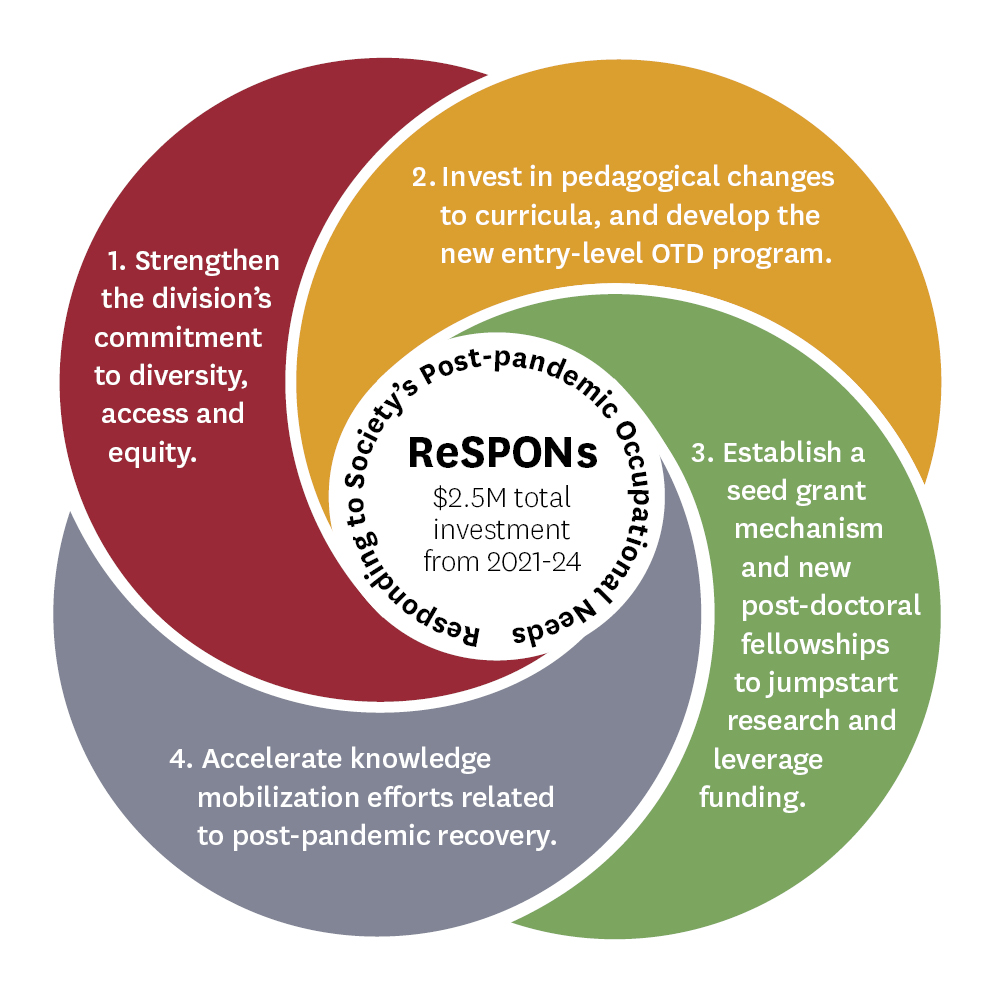USC Chan commits $2.5M to post-pandemic response
April 26, 2021
Three-year initiative to fast-track projects addressing occupational needs and health of individuals, families and communities.
Academics and Courses Associations and Bodies Community and Partners Diversity, Access, Equity Pandemic Research
By Mike McNulty
The USC Chan Division of Occupational Science and Occupational Therapy has launched a $2.5 million initiative comprising a variety of projects aimed at the coronavirus, economic and racial pandemics, the combined effects of which are sure to be felt for years, if not decades, to come.
Responding to Society’s Post-pandemic Occupational Needs — known as the ReSPONs initiative — was announced today by Associate Dean and Chair Grace Baranek in an email to faculty, staff and students. The three-year project will jumpstart stakeholder-engaged research, mobilize occupation-based knowledge, financially support postdoctoral fellows and students from underrepresented groups, build more responsive and inclusive curricula while strengthening the division’s commitment to diversity, access, equity, anti-racist and restorative practices.
The initiative was developed as part of USC Chan’s strategic plan in light of the confluence of multiple pandemics in the US. The independent and combined impacts of COVID-19, systemic racial injustices and widening occupational inequalities upon physical, mental, social, emotional and economic health have utterly disrupted the lives of people, families and communities throughout Los Angeles, California and the nation.
“It’s not enough to make it through these pandemics intact, and then just go back to our old business as usual,” Baranek said. “Instead, we have to confront many serious questions about the construction of everyday life, care access and delivery and the social determinants of health, and then partner with our communities to reimagine occupation-focused answers that can make real differences.”
As key health professionals, occupational therapists focus on empowering people of all ages to experience healthier, more satisfying lives by enhancing the ability to perform everyday activities, participate in meaningful routines and engage in health-promoting lifestyles. The research discipline of occupational science was conceptualized to design and implement studies focused on large-scale social issues, such as homelessness and poverty, as well as to address health, well-being and quality of life priorities at the individual level.
“There is no doubt that we are currently facing a once-in-a-generation inflection point,” said Avishai Sadan, dean of the Herman Ostrow School of Dentistry of USC, where USC Chan is housed. “The ReSPONs initiative will empower the USC Chan Division to leverage their excellence in education, research and practice today, in order to help realize a better and more just tomorrow.”
A response that starts with students
First and foremost, the ReSPONs initiative will enhance learning experiences, opportunities and outcomes of current and future USC Chan students, positioning this critical mass of future occupational therapists to better meet society’s diverse needs in the years and decades ahead.
The initiative earmarks funding to expand the division’s financial aid capacity over the next three years, including awards for students who epitomize the values of the American Occupational Therapy Association’s official vision statement, such as cultural responsivity and fluidity, a collaborative spirit to effect change and dynamic leadership potential.
The initiative also provides opportunities for students to work alongside USC Chan faculty members to evaluate and recommend justice, equity, diversity and inclusion resources and programming. Those recommendations can be infused throughout the division to improve climate, teaching and mentorship, including an overarching theme in USC Chan’s new Entry-Level Doctorate of Occupational Therapy degree program. With candidacy status recently granted by the national occupational therapy accrediting agency, this new entry-level OTD program will open its doors to incoming students as early as August 2022.
Additionally, the initiative will expand alternative fieldwork models, such as telehealth service delivery, as well as role-emerging settings, which are organizations and sites in diverse communities that do not have a dedicated occupational therapy employee. In the earliest stages of the coronavirus pandemic, the vast majority of student fieldwork experiences pivoted to these alternative models and role-emerging settings. One year later, these models have shown preliminary effectiveness, but establishing and sustaining them has been highly time- and labor-intensive. By better integrating them into USC Chan’s curricula and infrastructure going forward, students will have more options for customizing their learning and completing their degree on time.
Accelerating research and mobilizing it for use
Another major area that the ReSPONs initiative focuses on is the generation of new research to address society’s post-pandemic needs, and the mobilization of new knowledge for broader uptake beyond the bubble of academia.
ReSPONs will fund more than one dozen, single-year grants to support the earliest stages of new research projects. These seed studies, which may total up to $50,000 apiece, can then be expanded for larger extramural funding opportunities.
The initiative will also fund several new postdoctoral fellowships focused on addressing occupational disruptions and health disparities in underrepresented populations. These fellowships are also seen as educational opportunities to accelerate the careers of diverse junior researchers in occupational science and occupational therapy.
The initiative will also help support the 2021 USC Chan Occupational Science Symposium, the division’s premier academic event for fueling and disseminating occupational science theory, research and practice innovations. It will help activate partnerships among interdisciplinary scholars and community stakeholders, and increase the impact and visibility of scholarship by publishing on free, open access sources.
“Although we’re still physically apart, the ReSPONs initiative unites the entire USC Chan Division in our ongoing vision to transform health and well-being through meaningful occupations and engaged partnerships,” Baranek said.
⋯






